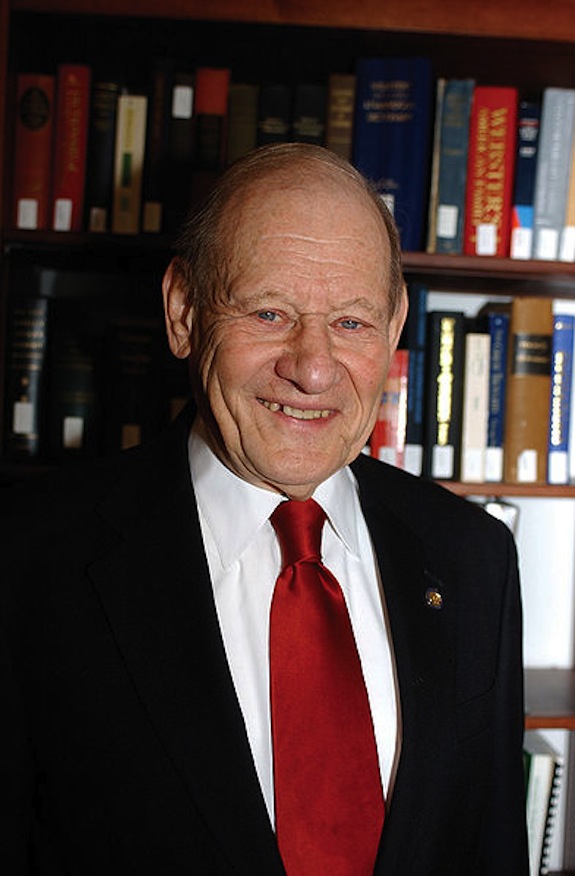Two Pillars of Skepticism—Leon Jaroff and Paul Kurtz—Died This Weekend
Leon Jaroff and Paul Kurtz both died this weekend. Together, the two men represent some of the founding ideas of the modern skeptic community

Paul Kurtz. Image: Center for Inquiry
Leon Jaroff, the man who founded Discover Magazine in 1980, has died at the age of 85. Paul Kurtz, a philosopher, was only a year older than Jaroff and also passed away this weekend. Together, the two men represent some of the founding ideas of the modern skeptic community.
Skeptics are an intense bunch. They’re dedicated to rationality, and they have little tolerance for claims that don’t stack up. Religious, paranormal and occult phenomena are favorite skeptic targets, but skeptic might call out ideas from the more mushy-gushy scientific disciplines, like sociology, as pseudoscience, as well.
Jaroff’s idea for Discover came from simple observation. As The New York Times writes:
As early as 1971, Mr. Jaroff noticed that newsstand sales of Time magazine jumped almost every time a science article was on the cover, and he began presenting the numbers to corporate executives. “He managed to persuade the heavyweights,” Frederic Golden, a former science writer and editor at Time and Discover, said. “Selling science to people who graduated to be managers was very difficult.”
Jaroff edited Discover for four years, but eventually went back to Time, mostly because Discover wanted to expand into sciences that Jaroff wasn’t fond of. The Times again:
But after a disagreement with his bosses about expanding coverage of psychology and psychiatry — “I didn’t think they were very solid sciences,” he once said — Mr. Jaroff returned to Time.
That skepticism fueled much of Jaroff’s work. He later became the Skeptical Eye columnist for Discover and then Time. He worried that pseudoscience, creationism, alternative medicine and the like were huge issues. And long before the vaccine question came to the forefront of American health politics, Jaroff challenged vaccine doubters, writing: “What happened to the quarantine notices that were once routinely posted on houses afflicted by measles, mumps or whooping cough? Or the long rows of iron lungs filled with polio victims unable to breathe on their own? Why do the words diphtheria and scarlet fever draw only blank stares from today’s kids? Because of vaccines, that’s why.”
Paul Kurtz, on the other hand, was a philosopher. He founded the Council for Secular Humanism and the Committee for Scientific Investigation of Claims of the Paranormal—a group that is now called CSI, or the Committee for Skeptical Inquiry.
Today’s skeptics are a bit different from Kurtz and Jaroff. Skeptic Blog explains:
I remember meeting Paul Kurtz for the first time. He was very interested in who I was and what I was doing in my local group. He had a clear passion for promoting rationalism. I was also struck, however, by how closely tied secular humanism and skepticism were in his approach. This would ultimately cause some tension between CSI and the local groups, a tension that exists to this day within the skeptical movement. In his later years Kurtz would also have to deal with another internal tension – that between aggressive “new atheists” and the softer approach that Kurtz advocated.
The push and pull between the groups is still alive and well today. A story in The New York Times from 2010 explains why the transition of power in the Center of Inquiry was so rough. In the story, Kurtz is referred to as “the exiled founder” who’s “fall” is “Lear-like.” The Times writes:
But Mr. Kurtz’s second complaint goes beyond internecine power struggles. He said that Mr. Lindsay was turning the center away from Mr. Kurtz’s humanist philosophy and toward negative, angry atheism.
According to Mr. Kurtz, skeptics must do more than just deride religion. “If religion is being weakened, what replaces it in secular society?” he asked. “Most of my colleagues are concerned with critiquing the concept of God. That is important, but equally important is, where do you turn?”
Regardless of the later struggles, Kurtz was hugely influential in bringing the skeptic movement together. The American Humanist Association writes:
“Paul Kurtz worked tirelessly for decades to see secular humanism become accepted as an alternative philosophy to traditional religion,” said Roy Speckhardt, the executive director of the American Humanist Association. “The attention and guidance he gave to the humanist movement had an unmistakable global impact.”
Losing these two men together in the same weekend is a blow to the history of skepticism. But there are many moving forward in their path.
More from Smithsonian.com:
When Continental Drift Was Considered Pseudoscience
Climate Skepticism Could Wipe Out Whole Towns in Australia
/https://tf-cmsv2-smithsonianmag-media.s3.amazonaws.com/accounts/headshot/Rose-Eveleth-240.jpg)
/https://tf-cmsv2-smithsonianmag-media.s3.amazonaws.com/accounts/headshot/Rose-Eveleth-240.jpg)